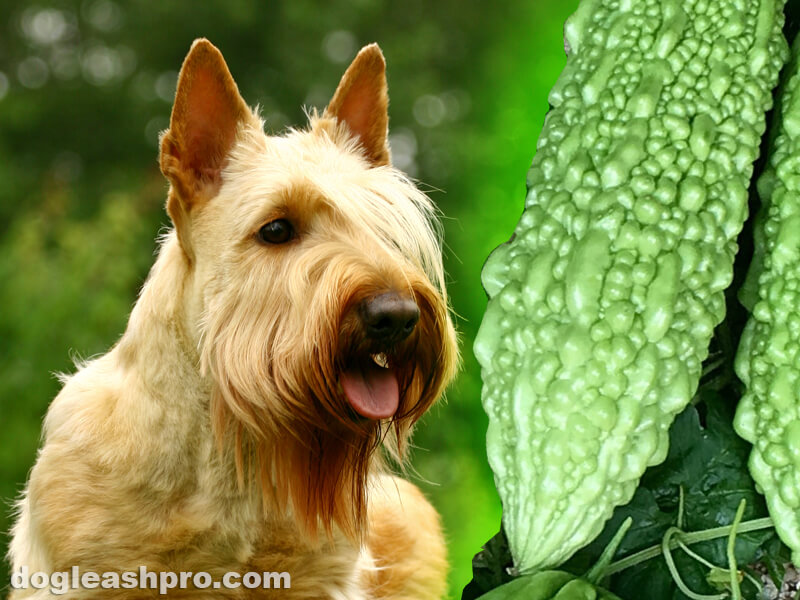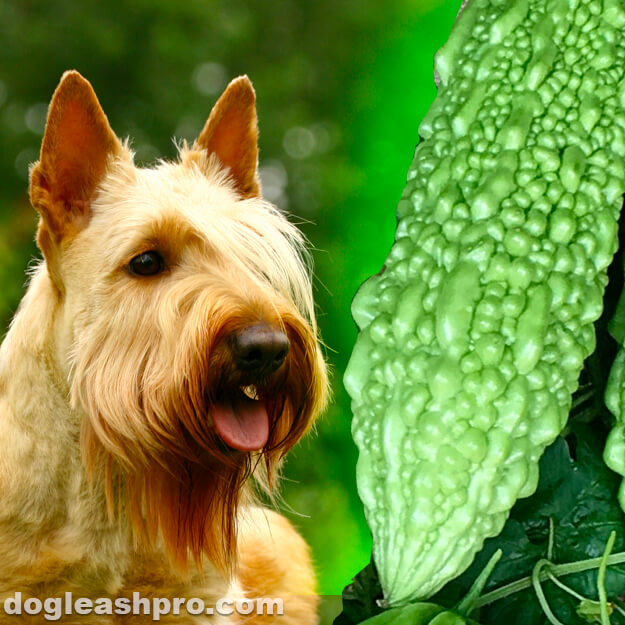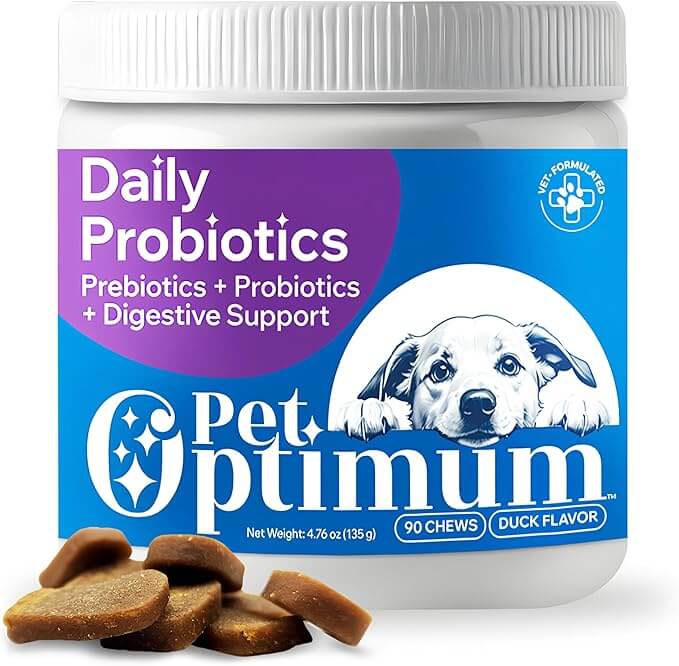
I came home with a few bags of groceries yesterday and accidentally left them on the kitchen floor. My yellow Labrador was very curious and got into my grocery bag of Bitter melons. Her curiosity led her to take a few bites out of one of the Bitter melons. When I found out, I panicked. I wondered if Bitter melon is safe for dogs to eat and this incident inspired me to write this article.
Can dogs eat Bitter melon? Yes, dogs can eat Bitter melon as it is safe for canine consumption. This bitter fruit has several health benefits for dogs. However, your furry friends should eat Bitter melon in moderation as an occasional treat. Bitter melon should not be a regular part of your dog’s diet.
For some reason, I thought the Bitter melon wasn’t good for dogs since it has a bitter taste and can irritate a dog’s mouth and the digestive system, similar to how the spicy Horseradish can irritate a dog’s throat, nose, and urinary tract. Boy was I wrong!
Table of Contents
Is Bitter melon bad for dogs?

No, Bitter melon is not bad or poisonous for dogs. Like other members of the Cucurbitaceae family — which includes pumpkin, zucchini, watermelon, and cucumber — Bitter melon is safe for most dogs. You can feed your furry friend cooked or raw Bitter melon without any worries.
However, raw Bitter melon can be awfully bitter. To make it pleasant for your canine companion, cook it plain and mix it with their favorite meal.
While dogs can eat some Bitter melon without any problem, too much of it can give them stomachache and indigestion problems. To make the most out of this nutritious fruit, feed your pooch Bitter melon no more than 1 to 3 times a week.
Dogs can eat the meat, skin, seeds, and leaves of the Bitter melon. But it is better to feed them seeds in moderation as eating too many seeds can cause digestive upset.
Bitter melon also supports insulin production, which can lower the dog’s blood sugar level. Diabetic dogs can benefit from the natural glucose-reducing property of the Bitter melon.
However, there are some conditions where Bitter melon can be considered unsafe for dogs.
- Eating Bitter melon along with taking diabetes medicines may lower your pup’s blood glucose level too much, which can lead to hypoglycemia.
- Pregnant dogs can experience miscarriage after eating Bitter melon. Therefore, avoid feeding Bitter melon to female dogs while they are expecting. It is also not advisable to give Bitter melon to lactating dogs.
- Some stomach issues are possible after your pooch feasts on too many Bitter melons. For example, your furry friend may vomit and have diarrhea or tummy ache after devouring a lot of them.
Let’s get a quick overview of what Bitter melon is and where it comes from and then dive into when you shouldn’t feed this bitter fruit to your canine companion.
What is Bitter melon?
Bitter melon—also known as Bitter Gourd—is a bitter-tasting fruit belonging to the Cucurbitaceae family. It has an oblong shape and recognizable warty skin.
Where does Bitter melon come from?
Bitter melon is a widely-used fruit in Asian and African cuisine. The fruit originated in Africa, but Asia is credited for domesticating and cultivating it for culinary use. Bitter melon grows in tropical regions and is a popular food plant.
Fun Fact: Pig feet is another popular dish that is enjoyed all around the world. In Asian cuisine, Pig feet are often braised with soy sauce and spices. Pig feet are also considered a soul food in the Southern U.S.
When shouldn’t you feed Bitter melon to your dog?

Bitter melon can raise a dog’s insulin level and decreases his blood sugar level. Diabetic dogs, who are on medication to lower their blood glucose, should not eat too much Bitter melon. This bitter fruit can cause their blood glucose levels to fall too low.
The intense bitter taste of Bitter melon is lessened by cooking and seasoning. While dogs can eat cooked Bitter melon, any unhealthy additives won’t sit well with them. Additives and seasonings like oil, salt, spices, onion, and garlic make cooked Bitter melon unhealthy and unsafe for canine consumption.
When cooking Bitter melon for your four-legged friends, keep it as plain as possible.
Bitter melon is dangerous when your dog is pregnant. There are enough cases of animals suffering miscarriages after eating Bitter melon for you to consider it a dangerous food for unborn pups.
In addition, Bitter melon is not recommended for mother dogs with infant pups since the mother dog is lactating.
Does Bitter melon provide nutritional benefits for your dog?

Bitter melon has very few calories and is full of vitamin C, vitamin A, and folate. It is packed with fiber and is fortified with iron, potassium, and zinc. Bitter melon is also high in antioxidants.
Let’s discuss how each of these can help your dog:
Vitamin C helps with a dog’s immune system
Vitamin C protects the dog’s body from diseases and helps reduce inflammation.
Vitamin A improves a dog’s skin and vision
Vitamin A improves vision and skin health in dogs. It also increases immunity and is vital for the proper functioning of cells.
Folate is an essential vitamin for dogs
Folate is an essential vitamin for canine development and growth.
Iron, potassium, and zinc promotes organ health in dogs
Iron, potassium, and zinc ensure proper bodily functions, immunity, and organ health.
Essential antioxidants for dogs
Bitter melon is packed full of antioxidants. Antioxidants prevent cell-aging in dogs and rid their bodies of environmental pollutants and free radicals. Antioxidants make bitter melon a cancer-fighting food.
High fiber promotes gut health in dogs
The high fiber content in Bitter melon promotes proper gut health and assists natural bowel movement in dogs.
If you’re looking for a probiotics dog supplement that also helps promote normal gut microflora, we highly recommend this:
Reduce blood sugar and cholesterol in dogs
Bitter melon also helps reduce blood sugar and cholesterol.
What if my dog accidentally ate a lot of Bitter melon?
Bitter melon isn’t a natural food for dogs, which is why they should eat it in moderation as an occasional addition to their meal or treat. It also has a significant hypoglycemic effect, making it unsuitable for dogs who suffer from low blood sugar.
Excessive consumption of Bitter melon can make any dog sick. However, it’s unlikely for any condition to require medical action or hospitalization. A few spells of vomiting and diarrhea aside, your dog will recover without any problems. During this, avoid feeding your pooch unnatural food.
Vomiting and diarrhea will reduce the dog’s fluid levels, so it’s best that provide a bowl of fresh cool water that’s easily accessible to your furry friends. This will help them stay hydrated.
If your canine companion is on diabetes medication, excessive Bitter melon can make their blood glucose level fall dangerously low. Make sure to contact your veterinarian immediately if that happens.
Symptoms to watch for
Bitter melon won’t likely lead to any dangerous symptoms. At most, eating a lot of it may upset your dog’s stomach, leading to vomiting and diarrhea.
If your dog is on sugar-controlling medicines, Bitter melon may give them hypoglycemia or dangerously low blood sugar. You may need to take your pooch to the vet if they show the following symptoms:
- Lethargy.
- Increased water intake and urination.
- Shivering.
- Blindness.
- Seizures.
- Loss of consciousness.
For pregnant dogs, be on the lookout for signs of miscarriage, including:
- Fever.
- Stomach ache.
Treatments if your dog has poisoning from eating too much Bitter melon
If your healthy furry friends have chomped down too many Bitter melons, the worst they’ll experience is a tummyache, some vomiting, and runny loose poop. The condition will stabilize in a day or after a few barfing and pooping sessions.
Make sure to give your pooch plenty of water during that period, as diarrhea and vomiting will dehydrate them.
Observe your pup’s condition for the remainder of the day. In the unlikely case that it doesn’t improve after 24 hours, you may need to take them to the vet.
Overweight and diabetic dogs can benefit greatly from the low-calorie, sugar-reducing Bitter melon. However, as mentioned before, dogs already taking glucose-reducing medications may have their blood glucose level fall too low.
If that happens, call your dog’s vet immediately. Make sure to tell them how much Bitter melon your pooch ate and any medication he or she is on.
Hypoglycemia is generally treated by replenishing the dog’s blood glucose levels. The vet may do that by administering an IV dextrose solution. Your canine companion may need additional blood tests and a period of veterinary observation before you can take him home.
If your female dog is pregnant when she consumed the Bitter melon, visit the vet as soon as possible. If the fetuses are viable, the vet will ensure the food doesn’t harm them any further. If the fetuses have expired, the vet will clean the dog’s womb from dead tissue.
Dog-friendly and safe alternatives to Bitter melon
There are several dog-friendly and safe alternatives to Bitter melon. The following fruits and vegetables are great for dogs:
- Watermelon is high in fiber, vitamins, and the antioxidant Lycopene. This succulent fruit is much juicier and sweeter than its cousin, the Bitter melon. While the flesh is a tasty summer treat for your canine friend, try to avoid feeding them the rind (skin) and seeds.
- Pumpkin is another relative of the Bitter melon and makes a tasty and healthy snack for dogs. It soothes tummy troubles in dogs and nourishes the good bacteria in their digestive tract through its prebiotic goodness.
- Carrots are rich in minerals and essential vitamins. From the leaves to the tip, carrots are a safe snack for your pooch. Make sure to chop the carrot into small pieces before feeding it to your pooch to prevent choking.
- Banana provides a rich dose of potassium, vitamins, biotin, and copper in a low-calorie package. In addition, bananas are high in natural sugar, making them an excellent reward meal. So if you want to treat your dog with something sweet, bananas are better than any sugary treat.
- Cucumber is another close cousin of the Bitter melon and is just as safe and healthy for your canine buddy. Cucumber is about 96% water and has very few calories, making it an ideal snack for overweight dogs.
My two pups love when I run out of the above fruits and vegetables because that means they can to enjoy these delicious treats instead:
So, can dogs eat Bitter melon?
If your dog likes to eat a lot of sugary treats, you can balance their daily sugar intake by feeding them Bitter melon. The ideal method is to give your dog cooked Bitter melon without the seeds once or twice a week at most. However, remember to keep the Bitter melon away from your pregnant dogs.
Related Questions
Yes, dogs can eat Bitter melon leaves. Although unappetizing, Bitter melon leaves are safe for dogs.
Bitter melon can provide dogs with several nutritional benefits and make for a fine addition to their diet.
Yes, dogs can eat Bitter gourd. Bitter gourd is just another name for Bitter melon and dogs can eat Bitter gourd safely in moderation.
Yes, Bitter gourd seeds are safe for dogs, but in moderation. Too many Bitter melon seeds may cause stomach discomfort in some small dogs.
No, Bitter melon is not toxic for dogs.
No, Bitter melons are not poisonous to dogs. Despite their bitter taste, Bitter melons are fine for dogs to eat.
Bitter melon can prevent cell degeneration, fight cancer, reduce cholesterol, lower blood sugar, and improve immunity in dogs.
Yes, dogs are capable of tasting bitter. This ability helps them avoid poisonous foods, which are usually bitter-tasting.
Bitter gourd or Bitter melon is known to cause miscarriage in pregnant animals. While research has yet to provide solid evidence, it’s best to keep Bitter gourd away from your pregnant dog.
DISCLAIMER: THIS WEBSITE DOES NOT PROVIDE MEDICAL ADVICE
The information, including but not limited to, text, graphics, images and other material contained on this website are for informational purposes only. No material on this site is intended to be a substitute for professional veterinary advice, diagnosis, or treatment. Always seek the advice of your veterinarian or other qualified health care provider with any questions you may have regarding dietary needs.
Resources:
https://en.wikipedia.org/wiki/Momordica_charantia
https://www.wikidoc.org/index.php/Bitter_melon

With over five years of specialized experience as an animal writer, my expertise lies in dog nutrition, health, behavior, grooming, and training. I am dedicated to delivering helpful and informative content that caters to the well-being of our furry friends. My primary goal is to empower pet owners with knowledge and ensure our canine companions thrive in health and happiness. In my free time, I love volunteering at local dog rescue centers.











